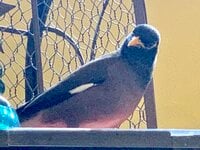Hi.
I have a pet Hill Mynah bird (now about 1 half years old) and was thinking if it is OK the clip his wings (same way as people often do with parrots and parakeets)?
Also interested to talk to anybody else who keeps this birds.
Mine lives in our garden in a large home made cage.
He seems very happy, but seems to want to be with me all the time. He gets super excited when I go to see him, and will perch on my arm and hand and likes to chew on my fingers inside the cage. He really seems to want to come out of the cage and be with me.
If I clipped his wings I could take him out into the garden and sit with him on my arm on the patio. I think he would get a lot of enjoyment out of that and more mental stimulation (and also learn a few more words).
I feel sorry for him when he is alone in the cage and I am in the house. If he spots me in the garden he will frantically call out and jump about to try to get to me.
I am only concerned that these birds are not suitable to have their wings clipped as they don't use their beaks to climb about like parrots. But he would still be able to jump high in his cage to the perches and his rooftop bedroom no problem.
Thanks for any advice.
I have a pet Hill Mynah bird (now about 1 half years old) and was thinking if it is OK the clip his wings (same way as people often do with parrots and parakeets)?
Also interested to talk to anybody else who keeps this birds.
Mine lives in our garden in a large home made cage.
He seems very happy, but seems to want to be with me all the time. He gets super excited when I go to see him, and will perch on my arm and hand and likes to chew on my fingers inside the cage. He really seems to want to come out of the cage and be with me.
If I clipped his wings I could take him out into the garden and sit with him on my arm on the patio. I think he would get a lot of enjoyment out of that and more mental stimulation (and also learn a few more words).
I feel sorry for him when he is alone in the cage and I am in the house. If he spots me in the garden he will frantically call out and jump about to try to get to me.
I am only concerned that these birds are not suitable to have their wings clipped as they don't use their beaks to climb about like parrots. But he would still be able to jump high in his cage to the perches and his rooftop bedroom no problem.
Thanks for any advice.



